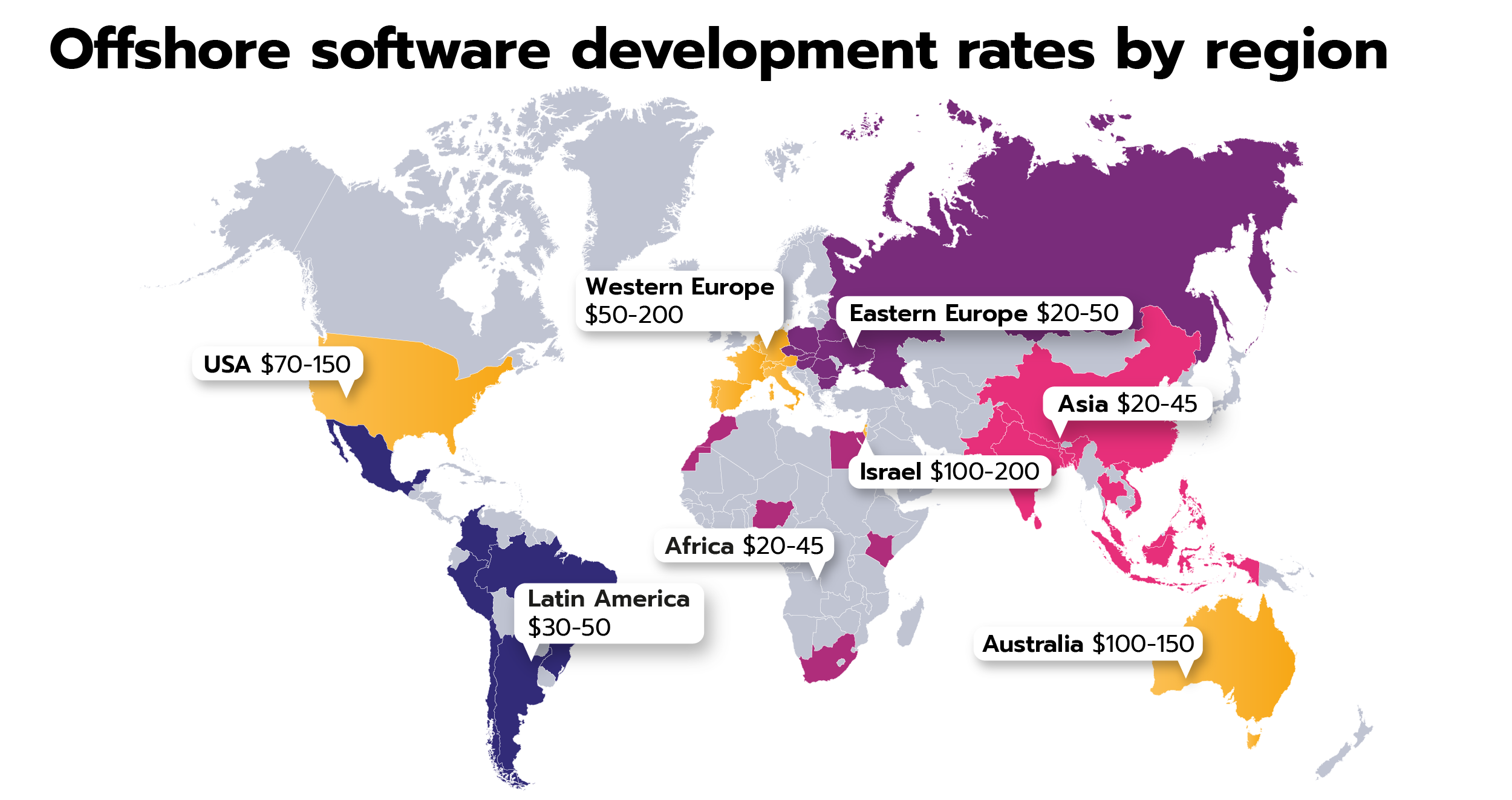Outsourcing software development offshore offers a strategic approach to enhance productivity and deliver top-notch solutions. This practice has revolutionized the tech industry, leading to cost-effective and innovative outcomes.
As businesses seek global talent and competitive advantages, exploring the realm of offshore software development presents a unique opportunity for growth and success.
Introduction to Offshore Software Development

Offshore software development refers to the practice of hiring a third-party company located in a different country to handle software development projects. This approach allows businesses to access a global talent pool and benefit from cost savings, specialized expertise, and increased scalability.
Benefits of Outsourcing Software Development Offshore
- Cost Savings: Offshore development often provides access to skilled professionals at a lower cost compared to hiring locally.
- Global Talent Pool: Companies can tap into a diverse talent pool and leverage expertise from around the world.
- Increased Scalability: Offshore teams can quickly scale up or down based on project requirements, offering flexibility and agility.
Examples of Successful Offshore Software Development Projects
One prominent example is the collaboration between Microsoft and Infosys for developing software solutions, which resulted in innovative products and successful deployment in the market.
Another successful offshore project is the partnership between Google and Wipro, where Wipro’s expertise in software development contributed to the launch of several Google products.
Factors to Consider Before Outsourcing Offshore

When considering outsourcing software development offshore, there are several important factors to keep in mind to ensure a successful partnership. One of the key considerations is selecting the right offshore development team that can meet your project requirements and deliver high-quality results within the specified timeline and budget.
Selecting the Right Offshore Development Team
When choosing an offshore development team, it is crucial to evaluate their technical expertise, experience, and track record. Look for a team with a proven record of successfully completing projects similar to yours and possessing the necessary skills and knowledge to handle the specific requirements of your project. Additionally, consider factors such as communication capabilities, project management processes, and responsiveness to ensure effective collaboration throughout the development process.
Evaluating Technical Expertise of Offshore Developers
To assess the technical expertise of offshore developers, you can request to see their portfolio, review case studies of previous projects, and conduct technical interviews to gauge their proficiency in relevant programming languages, technologies, and tools. It is essential to ensure that the offshore team has the expertise and experience required to deliver a high-quality product that meets your expectations.
Assessing Cultural Fit with Offshore Team
Cultural fit is another critical factor to consider when outsourcing offshore, as it can impact communication, collaboration, and overall project success. To assess cultural fit, consider factors such as language proficiency, time zone differences, work ethic, and communication styles. Building a strong relationship with your offshore team based on mutual respect, understanding, and effective communication can help overcome cultural barriers and foster a productive working environment.
Best Practices for Managing Offshore Software Development Projects

Effective management of offshore software development projects is crucial for success. It requires a combination of key communication strategies, collaboration tools, and ways to overcome time zone challenges.
Key Communication Strategies for Effective Offshore Project Management
Communication is the cornerstone of successful offshore software development projects. Here are some key strategies to ensure effective communication:
- Establish clear communication channels and protocols from the outset.
- Use a combination of synchronous and asynchronous communication methods to bridge the gap between time zones.
- Regularly scheduled meetings and status updates to keep all team members informed and aligned.
- Encourage open and transparent communication to address any issues or concerns promptly.
- Utilize project management tools to track progress and assign tasks efficiently.
Tools and Technologies that Facilitate Collaboration with Offshore Teams
Collaboration is essential for the success of offshore software development projects. Here are some tools and technologies that can facilitate collaboration with offshore teams:
- Collaboration platforms like Slack, Microsoft Teams, or Zoom for real-time communication.
- Project management tools such as Jira, Trello, or Asana for task tracking and assignment.
- Version control systems like Git for code management and collaboration.
- Cloud-based storage solutions like Google Drive or Dropbox for easy file sharing.
- Screen sharing tools for virtual meetings and code reviews.
Tips for Overcoming Time Zone Differences in Offshore Software Development
Time zone differences can pose a challenge in offshore software development projects. Here are some tips to overcome these challenges:
- Establish overlapping work hours to facilitate real-time communication between onshore and offshore teams.
- Set clear expectations regarding response times and availability across different time zones.
- Utilize shared calendars or scheduling tools to coordinate meetings and deadlines effectively.
- Encourage flexibility and understanding among team members to accommodate different time zones.
- Document important discussions and decisions to ensure all team members are kept in the loop.
Risks and Challenges in Offshore Software Development
When outsourcing software development offshore, there are several risks and challenges that organizations may encounter. It is essential to be aware of these potential hurdles in order to mitigate them effectively and ensure the success of the project.
Common Challenges in Offshore Software Development
- Lack of Communication: Communication barriers due to differences in time zones, language, and culture can lead to misunderstandings and delays in project progress.
- Quality Control Issues: Ensuring the quality of the code and deliverables can be challenging when working with a remote team that may not have the same standards.
- Security Concerns: Data security and protection of intellectual property can be at risk when sharing sensitive information with offshore development teams.
Strategies for Mitigating Risks, Outsourcing software development offshore
- Establish Clear Communication Channels: Regular meetings, status updates, and using collaboration tools can help bridge the communication gap between onshore and offshore teams.
- Implement Quality Assurance Processes: Setting up strict quality control measures and conducting regular code reviews can ensure that the deliverables meet the required standards.
- Sign NDA and Data Protection Agreements: Legal agreements can help protect sensitive information and intellectual property from being compromised.
Potential Pitfalls to Avoid
- Assuming Offshore Development is a Cost-Saving Solution: While offshore development can be cost-effective, focusing solely on cost without considering quality and other factors can lead to project failure.
- Ignoring Cultural Differences: Understanding and respecting cultural differences is crucial for effective collaboration and communication with offshore teams.
- Not Having a Contingency Plan: It is important to have a backup plan in case of unforeseen circumstances such as team turnover, project delays, or technical issues.
Conclusion: Outsourcing Software Development Offshore
In conclusion, outsourcing software development offshore proves to be a game-changer in today’s digital landscape, providing a gateway to unparalleled expertise, efficiency, and collaboration. Embracing this trend can lead to remarkable achievements and sustainable business growth.
Key Questions Answered
What are the common challenges in offshore software development?
Common challenges include communication barriers, cultural differences, and managing time zone disparities.
How can businesses mitigate risks in offshore development projects?
Businesses can mitigate risks by conducting thorough research on potential offshore partners, establishing clear communication channels, and setting realistic expectations.
What tools are recommended for collaborating with offshore teams?
Tools such as project management software, video conferencing platforms, and messaging applications are essential for seamless collaboration with offshore teams.
How important is cultural fit when working with an offshore team?
Cultural fit is crucial for fostering a positive working relationship and ensuring effective communication and collaboration between onshore and offshore teams.
